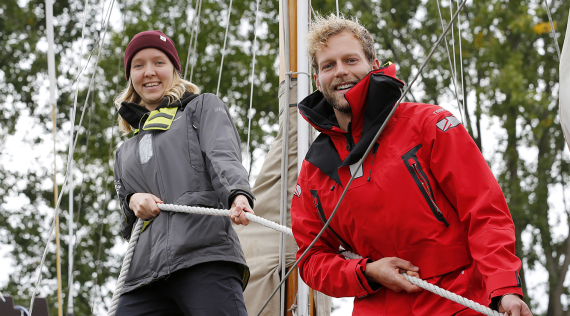A group of young people from all around Europe boarded a three-master on 2 October to sail to Latin America in seven weeks. Among them are Wageningen students Moon Weijens and Mark van der Poel. ‘We want to make a statement against the increase in air travel.’
Text Milou van der Horst Photo Aldo Allessie
How come air travel – one of the most polluting activities around – is still so cheap, easy and popular? This question has bugged Wageningen student Moon Weijens (International Land and Water Management) for a long time and she wanted to do something to draw attention to it. Together with three other Dutch students and ex-students, she came up with Sail to the COP. They rented the three-master Regina Maris, complete with a crew of five, and invited young Europeans to sail with them to the UN climate summit scheduled for 2 to 13 December in Santiago, Chile. Master’s student of Environmental Sciences Mark van der Poel signed up. Resource interviewed Weijens and Van der Poel just before they set sail.
What are you going to do?

Weijens: ‘As a group of 36 young people, we will sail in seven weeks to Chile – a voyage of over 10,000 kilometres –, because we want to make a statement about the growing air travel sector. We’ll be stopping in Casablanca, Tenerife, Cape Verde and Recife, and finishing in Rio de Janeiro. From there we’ll travel by bus to Santiago, which will take a week. Our five biggest partners – Climate KIC, WUR, the ministry of Infrastructure and Water Management, Better Places and ProRail – have given us a problem about sustainable and fair travel to try and solve during our voyage. A couple of partners have assigned a junior expert to join us and be part of our floating thinktank.’
We are showing that responsible travel is possible and even enjoyable
Why do you specifically target air travel?
Weijens: ‘It doesn’t get a mention anywhere in the Paris Climate Agreement. Farmers are going under because of the nitrogen restrictions, but air travel just goes on growing? That’s not fair. Also, 82 per cent of the world population have never flown, whereas they do suffer the consequences of climate change.’
Van der Poel: ‘The air travel industry is much more heavily subsidized by the government than other industries, whereas they don’t have to pay any tax. That’s outrageous. It is also important not to lay this problem at the individual traveller’s door. I for one try to live sustainably, I recycle and am a vegetarian. And I know that one flight is disastrous for my footprint, but it is hard to avoid flying altogether. Experience abroad is good for your personal development and future employers set store by it. With the no-fly movement and flight shaming, it seems it’s not OK to fly anymore; this feels like an attack on your personal choices. It’s very important that we talk about this more.’
Isn’t this also a good excuse for a nice sailing trip?
Van der Poel: ‘I’m a sailing instructor in Friesland and I have been to sea before, during the student event Race of the Classics. That was fantastic, so I’m looking forward to this trip tremendously. But I am genuinely concerned about climate change as well. After studying the climate for six years, this is the ultimate opportunity to make myself heard. And we are not just sitting back and having it all done for us. All the participants pay at least 2500 euros, they help sail, they have household duties, do preparatory research for the conference and participate in the thinktank. And it is a social experiment, actually. We all come from different cultural backgrounds and we’ll be together in a small space for a long time. I’m curious what that will be like.’
How did you raise the funds?
Van der Poel: We are paying a reduced fee for the boat because the person renting it out supports our principles. And we are all paying to participate and our partners are contributing. We also did some successful crowdfunding.’

What would make the voyage a success?
Weijens: ‘We want the world population to engage in climate-neutral and fair travel by 2050. To achieve that, we want to get people thinking about the impact of flying and to show that responsible travel is possible and even enjoyable. Finally, we want to raise our ideas at the climate conference. We are doing that through Marcel Beukeboom, for example. He is taking part in the climate summit as a Dutch Climate Ambassador, has a lot of contacts and is helping us get a chance to speak. It is partly thanks to him and our partners that we get to help organize a number of side-events.’
Van der Poel: ‘Imagine that each participant has about 100 contacts who hear about our project. That means thousands of people hearing about our ideas. Social movements start small. I see this as an opportunity to push society towards new travel options.’
How are you going home after the summit?
Weijens: ‘The participants organize their own return journey, as lots of them plan to stay in South America a while. Personally, I’m going to tour by bike. Half of the participants have already booked their return journey and are not going to fly. Most of them have booked a place on a container ship. Everyone shares experiences of finding a responsible means of transport back to Europe, so we have already established new contacts and found good websites. Because flying is not an option for any of us anymore.’
Van der Poel: ‘I’m going straight on to do my thesis research in Colombia. I want to make the return journey on a sailing boat as crew or as a “hitch-hiker”. There are lots of ports in South America. That’s what I’m going for!’

 Photo: Aldo Allessie
Photo: Aldo Allessie